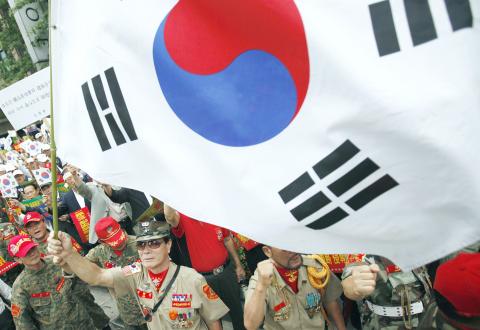Japan yesterday refused to take back a letter sent by its own prime minister after Seoul said it would not accept delivery of the note, as a row over islands threatened to descend into diplomatic farce.
It was the latest move in an increasingly bitter tit-for-tat dispute that has engulfed the two nations for nearly two weeks.
South Korea said earlier in the day it would return the protest from Japanese Prime Minister Yoshihiko Noda without answering it, for fear any move to acknowledge the missive would bolster Tokyo’s claim to islands that both sides say they own.

Photo: Reuters
That sparked an angry response from Tokyo, which accused its neighbor of contravening diplomatic norms.
“Under usual protocol, it is inconceivable that letters exchanged between leaders are sent back,” Japanese Chief Cabinet Secretary Osamu Fujimura, the government’s top spokesman, told a news conference.
“I hope [South Korean President Lee Myung-bak] will accept the letter, which was sent to deliver our prime minister’s thoughts,” he said.
The letter to Lee has not even made it to Seoul, having been kept at the South’s embassy in Tokyo, foreign ministry spokesman Cho Tai-young said, announcing the intention to hand the note back.
However, in what was beginning to look like a real live game of hot potato, the Japanese foreign ministry turned away a South Korean diplomat, believed to have been carrying Noda’s letter, at the gate of the ministry building, NHK footage showed.
“I’m sorry to say this, but returning a diplomatic letter is below even being childish,” Japanese Senior Vice Foreign Minister Tsuyoshi Yamaguchi said at a press conference.
The letter was subsequently put in the post, registered delivery, a spokesman at the foreign ministry in Seoul said.
Despite their strong economic ties, the two countries have a frequently uneasy relationship, in which historical animosities constantly play in the background.
That relationship has sharply worsened since Lee paid a surprise visit on Aug. 10 to the Seoul-controlled islands, known as Dokdo in Korean and Takeshima in Japan.
He said his trip, the first by a South Korean president, was intended to press Japan to settle grievances left over from its colonial rule in Korea from 1910-1945.
Lee further angered Japan by saying later that Emperor Akihito must sincerely apologize for past excesses should he wish to visit South Korea.
Noda’s letter said Lee’s visit to the islands and his call on the emperor were “regrettable,” Kyodo News said.
Noda upped the ante in Tokyo yesterday, telling lawmakers Lee’s remark “considerably deviates from common sense” and the president “should apologize for and retract it.”
He said Japan was keeping a cool head, but Seoul needed to calm down.
Tokyo, caught on the hop by the island visit, recalled its ambassador to Seoul, canceled a planned visit by its finance minister scheduled for this month and said it would review a foreign exchange swap accord.

‘TERRORIST ATTACK’: The convoy of Brigadier General Hamdi Shukri resulted in the ‘martyrdom of five of our armed forces,’ the Presidential Leadership Council said A blast targeting the convoy of a Saudi Arabian-backed armed group killed five in Yemen’s southern city of Aden and injured the commander of the government-allied unit, officials said on Wednesday. “The treacherous terrorist attack targeting the convoy of Brigadier General Hamdi Shukri, commander of the Second Giants Brigade, resulted in the martyrdom of five of our armed forces heroes and the injury of three others,” Yemen’s Saudi Arabia-backed Presidential Leadership Council said in a statement published by Yemeni news agency Saba. A security source told reporters that a car bomb on the side of the road in the Ja’awla area in

PRECARIOUS RELATIONS: Commentators in Saudi Arabia accuse the UAE of growing too bold, backing forces at odds with Saudi interests in various conflicts A Saudi Arabian media campaign targeting the United Arab Emirates (UAE) has deepened the Gulf’s worst row in years, stoking fears of a damaging fall-out in the financial heart of the Middle East. Fiery accusations of rights abuses and betrayal have circulated for weeks in state-run and social media after a brief conflict in Yemen, where Saudi airstrikes quelled an offensive by UAE-backed separatists. The United Arab Emirates is “investing in chaos and supporting secessionists” from Libya to Yemen and the Horn of Africa, Saudi Arabia’s al-Ekhbariya TV charged in a report this week. Such invective has been unheard of

US President Donald Trump on Saturday warned Canada that if it concludes a trade deal with China, he would impose a 100 percent tariff on all goods coming over the border. Relations between the US and its northern neighbor have been rocky since Trump returned to the White House a year ago, with spats over trade and Canadian Prime Minister Mark Carney decrying a “rupture” in the US-led global order. During a visit to Beijing earlier this month, Carney hailed a “new strategic partnership” with China that resulted in a “preliminary, but landmark trade agreement” to reduce tariffs — but

SCAM CLAMPDOWN: About 130 South Korean scam suspects have been sent home since October last year, and 60 more are still waiting for repatriation Dozens of South Koreans allegedly involved in online scams in Cambodia were yesterday returned to South Korea to face investigations in what was the largest group repatriation of Korean criminal suspects from abroad. The 73 South Korean suspects allegedly scammed fellow Koreans out of 48.6 billion won (US$33 million), South Korea said. Upon arrival in South Korea’s Incheon International Airport aboard a chartered plane, the suspects — 65 men and eight women — were sent to police stations. Local TV footage showed the suspects, in handcuffs and wearing masks, being escorted by police officers and boarding buses. They were among about 260 South